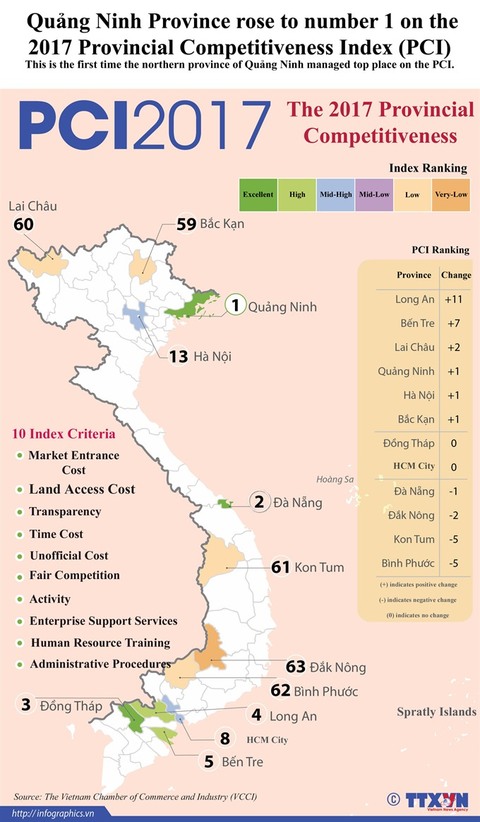
Quang Ninh, for the first time ever, became the most competitive locality in the country, topping the Viet Nam’s Provincial Competitiveness Index (PCI) 2017. — Photo vietnamnet
Quang Ninh, for the first time ever, became the most competitive locality in the country, topping the Viet Nam’s Provincial Competitiveness Index (PCI) 2017.
In the PCI 2017 report jointly launched on Thursday in Ha Noi by the Viet Nam Chamber of Commerce and Industry (VCCI) and the US Agency for International Development (USAID), the city gained the top score of 70.7 on a 100 point scale.
The report has been produced annually since 2005 to assess the ease of doing business, economic governance, and administrative reform efforts by the provincies and cities in Viet Nam in order to promote the development of the private sector.
The 2017 PCI Report is the 13th iteration and is based on responses from 12,000 enterprises, including more than 10,200 domestic private enterprises from 63 cities and provinces and nearly 1,800 foreign invested enterprises in 21 provinces in Viet nam.
According to the report, Quang Ninh was followed closely by Da Nang (70.1 points). Dong Thap ranks third with 68.8 points.
Other provinces and cities that found themselves in the good PCI tier are Lao Cai, Vinh Phuc, Ha Noi, Binh Duong, Thai Nguyen, Ba Ria – Vung Tau, and Bac Ninh.
Positive improvements have been the dominant trend in Viet Nam’s business environment for the past year, said Viet Nam Chamber of Commerce and Industry (VCCI) Chairman Vu Tien Loc during the launch of the report.
“Provinces and cities have actively implemented the directives of the Prime Minister, learning to employ good practices and experience from top performers in order to improve their local business environment,” Loc said.
Important policies and guidelines by the Government have led to positive improvements, such as Resolution 19/NQ-CP on “Improving the Business Environment, Enhancing the National Competitiveness”, Resolution 35/NQ-CP on “Supporting and Developing Enterprises through 2020”, and Directive 20/CT-TTg of the Prime Minister dated May 17, 2017 on “Rectifying Inspection Activities to Prevent Redundant, Overlapping and Unnecessary Inspections for Enterprises,” he added.
“The PCI report has been very influential in promoting transparency and good economic governance in Viet Nam. We look forward to continued strong economic growth and prosperity in the years ahead,” said US Ambassador to Viet Nam Daniel Kristenbrink at the launch.
According to Dau Anh Tuan, director of the VCCI’s Legal Department, the 2017 PCI report witnessed impressive reform efforts by local government across the country.
Many governance areas have been improved in 2017 to remove obstacles for businesses. Informal charges have been on the decline, the business environment has been more equal, and the administrative procedures have been simplified, he said.

The 2017 Provincial Competitiveness Index. — VNA Infographic
The 2017 PCI survey revealed optimism among the private and foreign business community helped raise their economic prospects.
Fifty-two per cent of PCI 2017 respondents in the domestic survey said they planned to increase the size of their operations over the next two years, the highest level since 2011, while the number of firms planning on scaling down or closing their business was extremely low at 8 per cent.
The share of foreign-invested enterprises (FIEs) that plan to expand their businesses in Viet Nam rose to 60 per cent, a level of ambition unseen the apex of 2010.
This year’s edition features a special chapter to analyse management issues of Vietnamese private enterprises. The analysis showed that management quality is associated with better performance.
Firms with good managers have higher growth rates in both employment and fixed capital investment. Firms that are able to obtain a one-point increase in management quality (on a four point scale) can expect to experience a 1.06 per cent increase in average annual capital growth.
Improving management quality is an important part of the solution to enhance the performance of domestic firms in order to increase their scale of operations and create opportunities to integrate more deeply into the global economy, thereby contributing significantly to the formation of a successful generation of competitive private firms in the international arena.
Launched since 2005, PCI is comprised of sub-indices such as entry costs, land access and security of tenure, transparency, time costs, informal charges, proactivity of the provincial leadership, policy bias, business support services, labour training policy, and law and order.
NEU’s report on Viet Nam’s economy
Also on Thursday in Ha Noi, the National Economics University (NEU), the Central Party Economics Committee and the National Assembly Economic Committee co-organised a seminar on Viet Nam’s Economy in 2017 and prospect in 2018, and launched the Viet Nam Annual Economic Report 2017, drafted by the NEU, with the theme “Removing Barriers to the Development of Vietnamese Private Enterprises.”
The report analyses the factual situations of private enterprises, compares them with those of State-owned Enterprises and FIEs, making judgments on the role of private enterprises in the whole economy, recommending general solutions to promote the development of the private business sector.
The report said private enterprises have to encounter many barriers on entering the markets, which are related to factors of production including capital, labour, land, technology, infrastructure and logistics.
It also clarifies barriers related to business registration, the fulfillment of taxation and custom responsibility and business activities, pointing out subjective and objective causes, recommending solutions to break down the barriers, especially the institutions and government management. — VNS